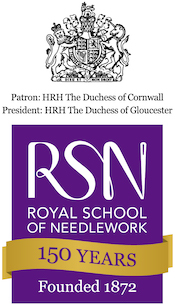Course overview
Year 1 - Level Four
Year 1
The first year of your RSN Degree study introduces you to a range of art and design practices and includes specialist technical skills in hand embroidery, taught by RSN-trained Tutors and practitioners.
- Canvaswork
- Blackwork
- Crewelwork
- Introductory Goldwork
- Silk Shading
The academic staff, who are practitioners, will work with you to develop your art and design vocabulary using visual research and design skills which you will be expected to apply to your experimental hand embroidery. As the year progresses there will be specific projects to explore how embroidery is applied to fashion, interiors and textile art.
Your practice is combined with contextual studies; this Unit is taught by academic staff experienced in museum curation and research within the area of fashion and textiles. The Unit is taught through gallery and archive visits, lectures, seminars and presentations. You will develop your research and presentation skills through seminars, presentations and essay writing.
Learning new hand embroidery stitches is combined with your art and design practice and we teach this through workshops, projects and individual tutorials as part of each Unit. Each project enables you to build skills in visual research and experimentation to develop your own visual language to develop your designs and collections. You are expected to experiment with your stitch practice using unconventional materials and applications.
Research
We will introduce you to a range of appropriate research and study skills for your academic writing as part of the unit Textiles in Context One. You will visit museums and galleries to introduce you to contemporary practices of curation. You will also carry out an object-based research project to develop your skills in visual and critical analysis. The textile handling collection, which is based in the RSN Degree library, allows you to explore and investigate textiles from the inside out to inform your practice based research and underpin your theory research for essays and seminar presentations. You will also have access to research resources through UCA and myUCA.
Assessment feedback
Assessment and feedback occurs in a number of different formats during your study.
Feedback is a fundamental part of the academic dialogue between yourself and your tutor. Feedback can be instructional (where we pass on technical guidance in the form of directions or tasks) or we may offer a constructive critique of your visual, design and practical work at a tutorial. Feedback may take the form of a tutorial (one-to-one or in a group), via a peer review or group crit (where you present your work to staff and peers and we give feedback on your work and presentation to you verbally).
We will also provide you with written feedback at tutorials (which will give you formative guidance to develop your work through action plans and tasks) or to give summative feedback at the end of a unit when we formally assess your work produced for the Unit. All of your Units of study will have Formative and Summative Assessment points on the academic calendar; enabling you to demonstrate to staff that you have achieved the Learning Outcomes of the Unit to the standard required. We will assess your work for the Unit against the Criteria specific to that Unit.
Sharing your learning outcomes and experiences amongst your peer group and to staff is a fundamental part of being a degree student here at the Royal School of Needlework.
